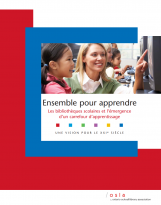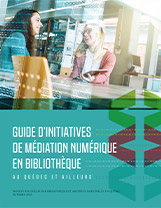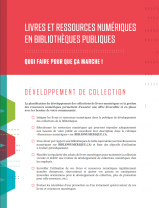Terms of use
Conditions for use of the works offered on the Biblius platform
These terms of use are defined by licences that govern digital books loans. These licences were developed to allow the pedagogical use of digital offerings on the Biblius Platform.
Length of loans
- Maximum 41 days.
- No late fees: at the end of 41 days, the loan is automatically returned to the catalog.
- Renewal of a loan that has expired generates an additional loan in the system.
Types of loans
- The simultaneity – or not – of a loan depends on the license purchased by the person(s) responsible for purchasing in each school environment.
Target audience
- Ebooks may be borrowed by any member of the school clientele (students and staff members).
- Thanks to a filter in the connector, elementary students do not have access to books for which the target audience is 12 years old and over.
- See the section on target audiences of the project for clarifications.
Reading devices
- E-books can be read on any kind of device that allows Internet access and an Office365 authentification: tablets, computers, smart phones, interactive digital boards, etc.
- Problems could be encountered with eReaders, most of which are not designed for browsing the Internet.
Reproduction rights
- The reproducing of digital works is not permitted, either in whole or in part, regardless of media type (vidéo, printed, etc.).
- The digital files on the Biblius platform are protected by a technological protection measure (TPM) that prevents their reproduction and access beyond the loan period, and ensures compliance with copyright legislation.
Projection
Teachers are ALLOWED to:
- Project all or part of an ebook on a smartboard.
- Projection is limited to one class of students maximum at the time.
- Assign ebook readings to a group of students.
- Remote teaching: Show an excerpt from or all of an ebook, via a screen-share function during a remote teaching session, provided that:
- Teaching is synchronous (live);
- The teacher has first borrowed the book;
- Sharing is limited to one class of students maximum at the time.
Teachers are NOT ALLOWED to:
- Project all or part of an ebook on a smartbord (or other projection device) in front of more than a group or a class at the time.
- Reproduce, in whole or in part, publications available on the Biblius platform.
- Share their user info with another user to provide them with access to the platform.
- Remote teaching:
- Make a video or sound recording containing an excerpt from or all of a book available on the platform as part of a lesson (asynchronous teaching).
- Show an excerpt from or all of a book to more than one group at a time.
Projection declaration
- When borrowing a e-book, teachers and school staff are invited to declare , on a voluntary basis, the projection of digital works on Interactive white board or by screen sharing, when distance teaching.
- To find out more, watch this video (in French).
Special education
Accessibility is at the heart of the approaches that support the Biblius project. Many development are still required to well serve all students.
In the meantime, you can watch this short video (in French only), which presents possible solutions to the problems that may arise with the text-to-speech function integrated into Biblius.
Resources
This section includes links and resources to support school libraries in the mediation, promotion and educational use of works in digital format.

Ensemble pour apprendre. Les bibliothèques scolaires et l’émergence d’un carrefour d’apprentissage : une vision pour le XXIe siècle
Ce document phare place le numérique au cœur de la conception des bibliothèques scolaires comme carrefours d’apprentissage. Il offre d’excellentes pistes pour amorcer ou enrichir les réflexions à ce sujet.

Guide d’initiatives de médiation numérique en bibliothèque au Québec
Ce guide présente plusieurs initiatives réalisées en bibliothèques publiques pour favoriser l’accessibilité et la mise en valeur des œuvres numériques. Plusieurs de ces initiatives pourraient être adaptées en bibliothèque scolaire.

Livres et ressources numériques en bibliothèques publiques : quoi faire pour que ça marche !
Ce guide présente une liste des meilleures pratiques pour valoriser les livres et ressources numériques en bibliothèque publique, notamment en ce qui a trait à la formation du personnel, au soutien aux usagers et à la visibilité. Plusieurs de ces initiatives pourraient être adaptées en bibliothèque scolaire.
Partager
Vous avez créé du matériel pour favoriser l’exploitation pédagogique ou la médiation des livres numériques en bibliothèque scolaire ? Vous pouvez le partager en remplissant les champs ci-dessous.
En déposant une ressource sur ce site, vous acceptez les conditions d’utilisation.
